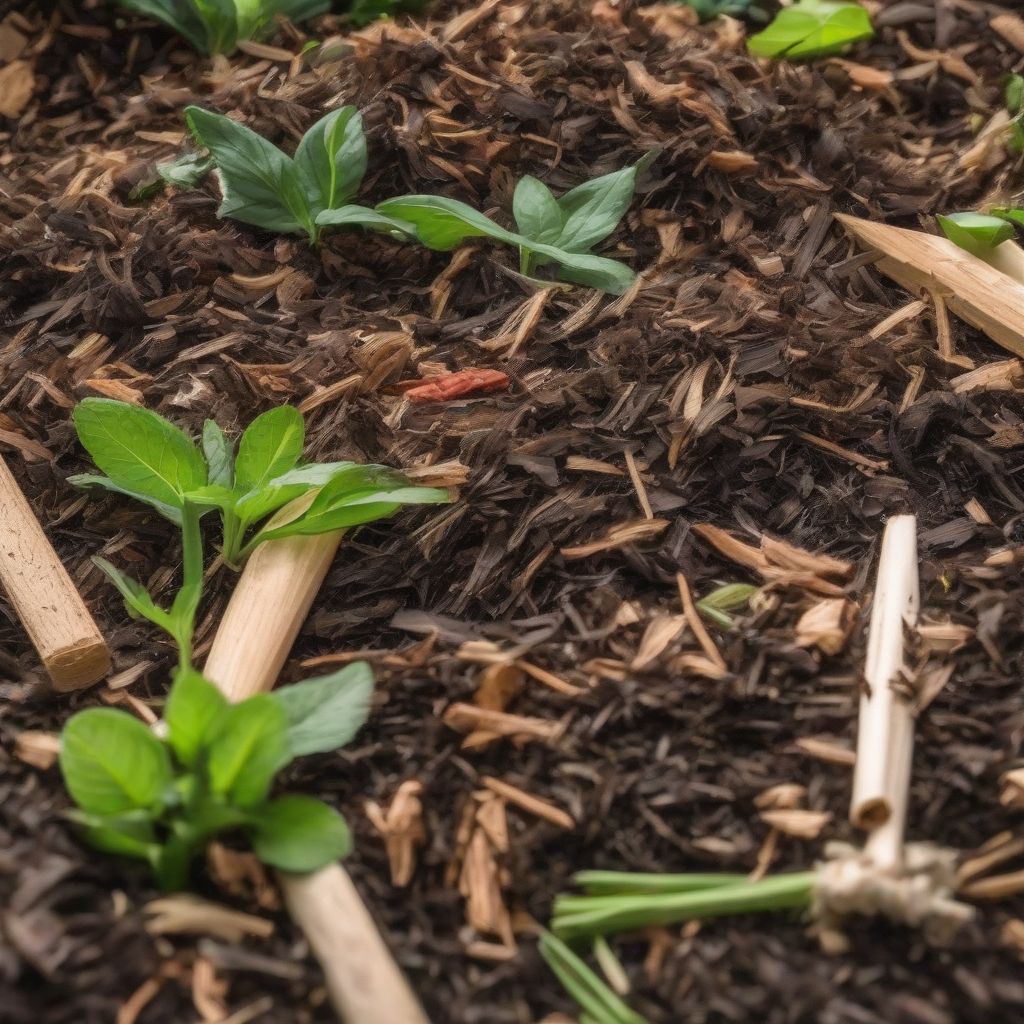Have you ever dreamt of a thriving garden bursting with life, where your plants flourish with minimal effort? A key secret to achieving this gardener’s paradise lies beneath the surface: healthy soil. And one of the most effective ways to nurture your soil and unlock its full potential is through organic mulching. In this comprehensive guide, we’ll explore the best organic mulch types for soil health, helping you choose the perfect one for your garden.
Understanding the Power of Organic Mulch
Organic mulch is like a protective blanket for your soil, offering a multitude of benefits. It suppresses weeds, conserves moisture, regulates soil temperature, prevents erosion, and enriches the soil as it decomposes. By mimicking nature’s processes, organic mulch creates a vibrant ecosystem teeming with beneficial microbes and earthworms, leading to healthier, more fertile soil.
Exploring the Best Organic Mulch Types
Wood Chips or Bark Mulch
A classic choice, wood chips or bark mulch provides excellent weed suppression and moisture retention. It decomposes slowly, enriching the soil with organic matter over time. Larger chips last longer, while smaller chips break down faster, providing nutrients more quickly.
Straw
Straw is a lightweight and readily available mulch, ideal for vegetable gardens. It helps regulate soil temperature and prevents soil compaction. As it decomposes, straw adds valuable organic matter to the soil, improving its structure and fertility. “Straw is particularly good for strawberries,” says renowned gardening expert, Jane Doe, author of “The Happy Gardener’s Guide.”
Grass Clippings
Grass clippings are a readily available and free source of mulch, perfect for adding nutrients back into your lawn or garden. Ensure the clippings are free of herbicides and pesticides before using them as mulch.
Shredded Leaves
Autumn leaves offer a free and abundant source of mulch. Shredded leaves decompose quickly, enriching the soil with essential nutrients. They create a natural habitat for beneficial insects and earthworms, boosting soil biodiversity.
Compost
Compost is a nutrient-rich mulch that provides a significant boost to soil health. It improves soil structure, water retention, and drainage. Compost also introduces a diverse range of beneficial microorganisms to the soil, further enhancing its fertility. Think of compost as a superfood for your soil!
Hay
Hay is a good option for mulching larger areas, providing effective weed suppression and moisture retention. However, be cautious as hay can sometimes contain weed seeds.
Seaweed
Seaweed is a fantastic source of micronutrients and adds valuable minerals to the soil. It can also help improve water retention and soil structure. Coastal gardeners have utilized the benefits of seaweed for centuries.
Cocoa Bean Hulls (Cocoa Mulch)
Cocoa mulch has a pleasant aroma and provides a dark, rich aesthetic. It’s also a good source of nitrogen. However, it can be toxic to dogs, so avoid using it if you have pets.
Choosing the Right Mulch for Your Garden
Consider your specific needs and the type of plants you’re growing when choosing a mulch. For vegetable gardens, straw or grass clippings are excellent choices. For flower beds and shrubs, wood chips, bark mulch, or shredded leaves are effective options. If you want to boost your soil’s fertility, compost is the ideal choice.
Applying Mulch Effectively
Apply a 2-4 inch layer of mulch around your plants, leaving a few inches of space around the base of the plant to prevent rot. Replenish the mulch layer as needed, especially after heavy rains or as it decomposes.
Frequently Asked Questions about Organic Mulch
What is the best organic mulch for vegetables?
Straw and grass clippings are excellent choices for vegetable gardens due to their lightweight nature and ability to regulate soil temperature.
What is the longest-lasting organic mulch?
Wood chips, particularly larger chips, are known for their longevity and slow decomposition.
Is it okay to mix different types of organic mulch?
Yes, combining different types of organic mulch can provide a wider range of benefits and create a more balanced soil ecosystem.
 Best Organic Mulch for Soil Health
Best Organic Mulch for Soil Health
Conclusion
Healthy soil is the foundation of a thriving garden. By choosing the right organic mulch and applying it effectively, you can nurture your soil, suppress weeds, conserve moisture, and create an environment where your plants can flourish. Remember to consider your specific needs and the type of plants you’re growing when selecting your mulch. Experiment with different types to see what works best for your garden.
What are your experiences with using organic mulch? Share your tips and success stories in the comments below! Let’s learn and grow together! Explore more gardening tips and resources on our website.



